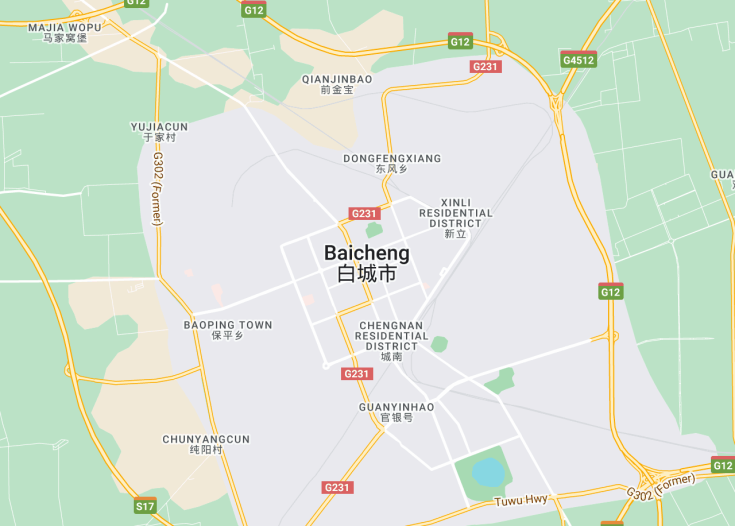Baicheng, situated in Jilin Province of China, boasts a unique blend of natural beauty and historical richness, making it an ideal destination for both nature lovers and culture enthusiasts. It is home to the stunning Chagan Lake, one of the largest freshwater lakes in China, famous for its traditional winter fishing, a practice enriched with cultural symbolism and entertainment. The city also serves as a gateway to the Changbai Mountains, offering picturesque landscapes and diverse wildlife. Baicheng’s multifaceted attractions encompass cultural heritage sites, relaxing natural retreats, and engaging local traditions, promising a fulfilling travel experience.
When visiting Baicheng, ensure to explore its natural reserves during different seasons as each offers unique scenic beauty and activities.
Plan your trip to coincide with the winter fishing festival at Chagan Lake to witness a spectacular cultural event unique to Baicheng.
Top things to do & see in Baicheng
Select the following sights and activities to discover best tickets and tours available in Baicheng.
Baicheng: Gateway to History and Culture in Jilin
| Country | China |
| Time in Baicheng | GMT+8 |
| Language spoken | Mandarin Chinese |
| Population | 2,033,000 (World Population Review) |
| Currency | Chinese Yuan (¥ / CNY) |
| Airports |
|
Baicheng, located in the northwestern part of Jilin Province in China, is an integral historical and cultural hub. Renowned for its rich heritage, the city offers a unique exploration into China’s northeastern traditions. It has served as a significant junction for railway lines and trade routes, shaping its diverse community and economic makeup. Historical landmarks like the Banlam Grand Buddha and the cultural events such as the Baicheng Carp Lantern Folk Festival enhance its cultural attractiveness, drawing visitors interested in authentic Chinese cultural experiences.
Where is Baicheng?
Baicheng is strategically positioned in Jilin Province, northern China, bordered by Inner Mongolia.
Distances:
| Route | Distance by car | Time by car |
|---|---|---|
| Beijing to Baicheng | 620 miles | 11 hours |
| Shenyang to Baicheng | 455 miles | 8 hours 15 min |
What is Baicheng famous for?
Baicheng is famous for its rich cultural tapestry and historical sites, including traditional festivals and landmark temples that offer insights into its ancient past and vibrant present.
History
Prehistory to Early Settlements
The region now known as Baicheng has been inhabited since prehistoric times, primarily by nomadic tribes. Archaeological finds, including stone tools and pottery, suggest a presence of human activity dating back thousands of years, pointing to a rich tapestry of ancient cultures.
7th Century to Late Qing Dynasty
By the 7th century, with the establishment of the Tang Dynasty, Baicheng’s strategic location became significant. The area served as a key crossroads for numerous nomadic tribes. By the time of the Ming and Qing dynasties, it evolved as a military and administrative point. Various fortifications and administrative buildings from this period contributed to its developmental heritage.
Early 20th Century
The early 20th century marked a period of significant change for Baicheng, as railways connecting it to major cities were constructed. This development turned Baicheng into an important regional transportation hub, fostering increased trade and migration which shaped its socio-economic landscape substantially.
Modern Day
In recent decades, Baicheng has embraced modernization while preserving its historical sites. It remains an important economic and cultural center in Jilin Province, reflecting a blend of rich historical heritage and modern development.
Visit Baicheng
What to see and do in Baicheng
Exploring Baicheng offers a blend of cultural history and natural beauty. Key attractions include:
- The Baicheng White Crane Nature Reserve, ideal for bird watching.
- The historic Zhenzhuquan, a site known for its springs and old architecture.
- The bustling Baicheng Cultural Park, offering insights into local traditions and modern art.
Cultural enthusiasts and nature lovers alike will find Baicheng to be a captivating destination.
Festivals and Events in Baicheng
Baicheng is vibrant with cultural festivals, notably the Baicheng Folk Festival in autumn and the Ice and Snow Festival in winter. These events showcase traditional music, dance, and crafts, as well as modern ice sculptures and winter sports, drawing both local and international visitors.
Best time to visit Baicheng
The optimal time to visit Baicheng is during autumn, from September to November, when the weather is mild and the cultural festivals are in full swing, offering a lively and enriching experience.
Is Baicheng worth visiting?
Baicheng presents a unique travel destination. Its appeal lies in the charming combination of cultural heritage and natural vistas. However, it may not cater as well to those seeking more urban entertainment or luxury amenities. The city’s remote location might also pose travel challenges. Overall, for travelers interested in enriching cultural experiences and natural beauty, Baicheng is certainly worth considering.









